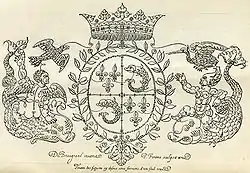Lineography
Lineography is the art of drawing without lifting the pen, pencil, or paintbrush that is being used.[1]

The practice originated in France in the seventeenth century. It fell into disuse by the early nineteenth century.[2] Lineography experienced a resurgence in 1960 with the release of the Etch A Sketch.[1]
In some instances, entire landscapes and still lifes have been drawn or painted using this lineographic technique.[3] Famous works of art, such as the Mona Lisa, have been reproduced using the Etch A Sketch.[4]
Pablo Picasso also drew in the lineography style. In his later career, after the surrealism period, he created a collection of over fifty drawings using the lineographic technique and a variety of media. The drawings mostly depict animals.[5]
The television show How It's Made used Lineography in the short segments at the beginnings of many episodes giving a summary of the history of the episode's subject.
See also
References
- Davis, Ken (2007-01-02), "Thinking Inside the Box" (PDF), Unitrin Specialty Update: 10
- Hanton, George (1927). French Lineography. New York: Gregory Kline Books. p. 2.
- Hanton, George (1927). French Lineography. New York: Gregory Kline Books. p. 27.
- "Mona Lisa in Etch A Sketch". Speeple News. 2007-09-14. Retrieved 2008-02-01.
- "Set of 6 Picasso Line Drawings". The British Antique Dealers' Association. Retrieved 2023-02-23.